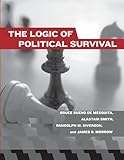The logic of political survival / Bruce Bueno de Mesquita, Alastair Smith, Randolph M. Siverson, and James D. Morrow
Material type: TextPublisher: Cambridge, Mass. : MIT Press, 2003Copyright date: c2003Description: xiii, 536 pages : illustrations ; 24 cmContent type:
TextPublisher: Cambridge, Mass. : MIT Press, 2003Copyright date: c2003Description: xiii, 536 pages : illustrations ; 24 cmContent type: - text
- unmediated
- volume
- 9780262524407
- 0262524406
- 0262025469
- 9780262025461
- JF285 .B78 2003
| Item type | Current library | Call number | Status | Date due | Barcode | |
|---|---|---|---|---|---|---|
| Books - Printed | PERPUSTAKAAN GUNASAMA HAB PENDIDIKAN TINGGI PAGOH Main Library General | JF285 .B78 2003 (Browse shelf(Opens below)) | Available | SF0000746 |
Browsing PERPUSTAKAAN GUNASAMA HAB PENDIDIKAN TINGGI PAGOH shelves, Shelving location: Main Library General Close shelf browser (Hides shelf browser)

|

|

|

|

|

|

|
||
| JF1601 .M67 2008 Motivation in public management : the call of public service / | JF195 .G68 2003 Governing insecurity : democratic control of military and security establishments in transitional democracies / | JF229 .V52 2007 The rise of the unelected : democracy and the new separation of powers / | JF285 .B78 2003 The logic of political survival / | JF51 .C65 2004 Comparative politics today : a world view / | JF51 .C654 2004 Comparative politics : theoretical framework / | JF51 .C66 2006 Comparative politics : notes and readings / |
Includes bibliographical references (pages 503-518) and index
I: A theory of political incentives -- 1. Reigning in the prince -- 2. The theory: definitions and intuition -- 3. A model of the selectorate theory -- II: Policy choice and political survival -- 4. Institutions for Kleptocracy or growth -- 5. Institutions, peace, and prosperity -- 6. War, peace, and coalition size -- 7. Political survival -- III: Choosing institutions -- 8. Institutional preferences: change from within -- 9. The enemy outside and within: war and changes of leaders and regimes -- 10. Promoting peace and prosperity
"The authors construct a provocative theory on the selection of leaders and present specific formal models from which their central claims can be deduced. They show how political leaders allocate resources and how institutions for selecting leaders create incentives for leaders to pursue good and bad public policy. They also extend the model to explain the consequences of war on political survival. Throughout the book, they provide illustrations from history, ranging from ancient Sparta to Vichy France, and test the model against statistics gathered from cross-national data. The authors explain the political intuition underlying their theory in nontechnical language, reserving formal proofs for chapter appendixes. They conclude by presenting policy prescriptions based on what has been demonstrated theoretically and empirically."--Jacket
There are no comments on this title.
